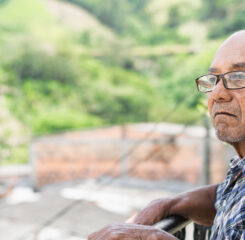Affordable housing leaders may soon be able to tap substantial amounts of funding for broadband infrastructure and digital equity, and a new guide describes how affordable housing stakeholders may benefit from the funding.
“ConnectHomeUSA Guide to New Broadband Funding for HUD-Assisted Communities” is a new resource for states and organizations from the U.S. Department of Housing and Urban Development (HUD).
Leveraging this funding will also be a topic of the 2023 Health & Housing Symposium: Digital Equity is Health Equity, to take place on Sunday, April 16, 2023, from 2-5 p.m. at the Omni Shoreham Hotel in D.C. The symposium will precede the LeadingAge Leadership Summit, which runs April 17-19.
About the Funding
Historic funding levels are now available through the $65 billion Internet for All initiative, says a HUD statement. Funds come through two programs: the Broadband Equity, Access, and Deployment (BEAD) and the Digital Equity Act (DEA).
The guide will help leaders at public housing authorities (PHAs), multifamily owners and operators, and Tribes understand the programs’ mechanics—and how to bring funds to their neighborhoods.
Now is the time for PHAs, tribes, and multifamily housing organizations to contact their state broadband offices (SBOs). SBOs are required to consult a wide range of organizations, including PHAs and other affordable housing entities that work with low-income Americans, as they develop action plans for these programs in the coming months. The guide tells how to contact state broadband leaders to bring attention to a community.
All 50 states; Washington, D.C.; and Puerto Rico have received planning funding under these programs. An Internet for All map shows program status for each state.
About the Programs
The guide offers the following information about each program. The Broadband Equity, Access, and Deployment (BEAD) grant offers $42.45 billion in total funding. In relation to HUD-assisted communities, its priority areas are projects serving unserved and underserved locations, connecting eligible community anchor institutions (such as PHAs), and installing or reducing the cost of Wi-Fi in multi-family residential buildings. States will likely begin deploying funds at the end of 2023.
The Digital Equity Act (DEA) encompasses three grant programs. The State Digital Equity Planning Grant Program will release funds first and provides $60 million for states, territories, and Tribal organizations to develop digital equity plans. See frequently asked questions. PHAs or multi-family housing organizations could have the option to serve in different roles; they may be able to administer the grant or could collaborate as a key stakeholder. The guide shares details.
In early to mid-2024, the State Digital Equity Capacity Grant will award $1.44 billion over five fiscal years to states (including the 50 states, the District of Columbia, and Puerto Rico), other
territories, and Tribal entities to implement their state digital equity plans.
Download the guide to learn more.
Symposium on Digital Equity Happens April 16
A special session on digital equity will kick off the upcoming LeadingAge Leadership Summit, to be held April 17-19 in Washington, D.C. The 2023 Health & Housing Symposium: Digital Equity is Health Equity will take place on Sunday, April 16, 2023, from 2-5 p.m., also at the Omni Shoreham Hotel in D.C.
Adrianne Todman, Deputy Secretary of the U.S. Department of Housing and Urban Development, will give a keynote on the vision for digital equity in affordable housing. The session will also highlight innovative models of digital inclusion, care, service, and housing to improve health equity, health outcomes, and the ability to age in community. Participants can brainstorm ways to leverage new funding to erase the digital divide for older adults.
A networking reception follows from 5-6:30 p.m. This symposium is offered in partnership with the LeadingAge Leadership Summit, presented by Parker Health Group, Inc., and hosted by Volunteers of America National Services.

 Shutdown Week Three: Impact of Ongoing Closure on Affordable Housing
Shutdown Week Three: Impact of Ongoing Closure on Affordable Housing


